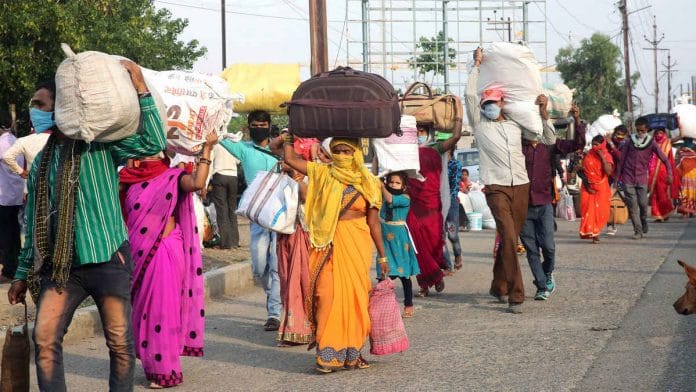New Delhi: Conducting regular urban surveys, improving the training of city planners and empowering city and local governments are part of the post-pandemic urban reforms recommended by a World Economic Forum (WEF) report.
Titled ‘Indian Cities in the Post-Pandemic World‘, the report, released Thursday, in collaboration with the think tank IDFC Institute in Mumbai, includes recommendations from 14 experts to translate lessons learned from the pandemic into a new urban reforms agenda.
These experts include Shamika Ravi, Non‑Resident Senior Fellow at Brookings Institution; Lizzette Soria Sotelo, Policy Specialist– Safe Public Spaces at UN Women; Chinmay Tumbe, Assistant Professor at IIM Ahmedabad, and others.
Their insights were compiled through interviews and consultations across seven themes — planning, housing, transport, environment, public health, gender and vulnerable populations in cities.
The report notes that approximately 70 per cent of India’s GDP comes from its cities, which have accounted for most of the contagion during the pandemic. The pandemic has also “exposed existing fault lines” in terms of economic disparity, inadequate access to affordable housing, gender disparities, unequal access to core public services and more.
“The pandemic is an opportunity to address historical urban challenges and bring about positive long‑term change,” said Viraj Mehta, WEF’s Head of India and South Asia and Member of the Executive Committee, in a statement.
Similarly, Reuben Abraham, CEO and Senior Fellow at IDFC Institute, said the pandemic can be a “turning point in India’s urban journey”.
Also read: How urban planning can make Indian cities more inclusive for women
Housing reforms, mass transport that maintains physical distancing
The WEF report suggests that for better-planned cities, urban governance needs to be decentralised, city‑level bodies should be more independent and autonomous, and reforms are needed in the training of city planners.
In terms of housing, the report suggests doing away with “arbitrary directives” and “repressive development regulations” that do not make optimal use of available land, like caps on Floor Space Index (FSI). FSI is the maximum area that can be constructed on a plot of land, which is usually regulated by municipal or local authorities.
To address mass transport problems, the report recommends discouraging excessive personal car use by offering alternatives that also account for physical distancing. For example, minibuses that provide a smaller footprint and run faster than urban buses or small, air‑conditioned electric scooters like the Toyota‑I‑road.
The report also explores the possibility of integrating taxis and auto-rickshaws with trains and buses to improve the management of mass transport.
Also read: Smart city technologies can tackle India’s urban explosion. But key questions must be asked
More healthcare data, protecting women & vulnerable sections
In September 2020, a survey found that 78 per cent of Indians used “connections and clout” to get a Covid ICU bed while 40 per cent claimed they had to follow up extensively, escalate the issue via social media or complain to the government.
To bridge gaps between demand and supply of healthcare services, the WEF report calls for more robust data on disease incidence, accessibility issues and quality of existing facilities and services alongside information on existing healthcare infrastructure and personnel training.
In the report, Shruti Rajagopalan, Senior Research Fellow, Mercatus Center at George Mason University, argues for more fiscal and political federalism to address public health issues. Citing Kerala’s Covid‑19 responsiveness, she praised its decentralised health system and “resilient” local self‑government for providing services to infected people and in isolating potential cases.
On protecting vulnerable populations like migrant workers and urban poor, the report calls for regular urban surveys and building a diversity index of migrants so that there can be specific policy decisions for those who live out‑of‑state.
The report also talks about the BJP government’s “One Nation One Ration Card” scheme as a policy that could help people climb the income ladder and move out of slums. However, it notes, “several challenges exist, including district coordination and political backlash”.
To enhance the safety of women in public spaces, the report recommends ‘mixed‑use streets’ where some businesses are open late into the night, and are therefore kept well lit and active with sufficient bystanders of different genders at various times of the day.
Also read: No longer a haven for retirees, Pune is growing into another Indian urban mess






